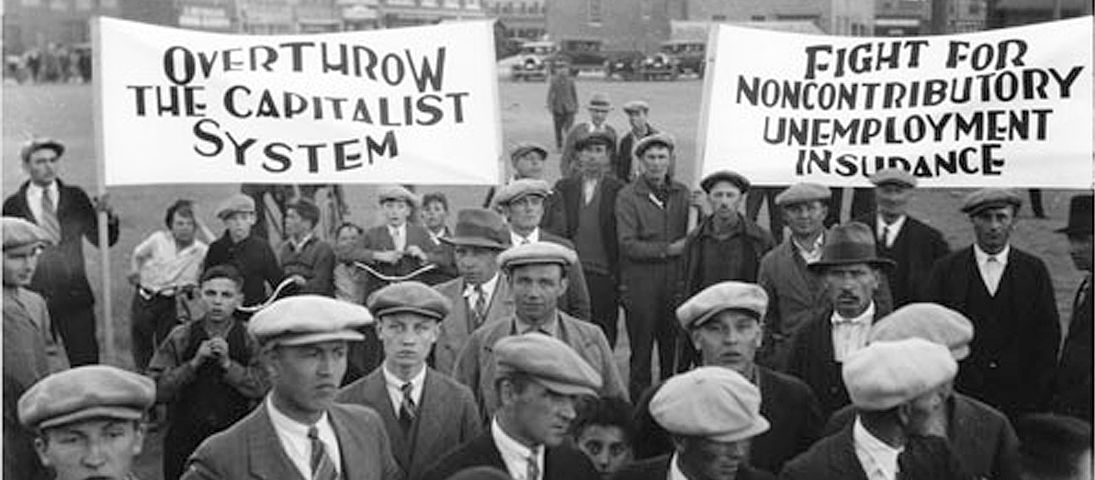[buzzsprout episode=’5748790′ player=’true’]
By Liz Rowley
The Prime Minister’s decision to prorogue Parliament until September 23 is an effort to position the Liberals as defenders of the 7 million people who lost their jobs this spring, the 8.4 million who needed CERB and the 4.5 million who will still need CERB after it wraps up August 29.
Media reports about job creation and economic recovery are overblown and out of sync with the reality of a 28 percent unemployment rate among women and 24 percent among men. These more than 5 million people include the officially registered unemployed, those who have given up looking for work, and those who are working less than 50 percent of the hours worked before the crisis. Many working people have seen their savings evaporate and are hanging on by a thread.
This crisis is deep and structural. It will get much worse if a second wave of COVID descends, or if Parliament does not act decisively to protect incomes for unemployed and precarious workers, create good jobs and raise wages and living standards.
Justin Trudeau claims the Liberals have a plan to support the unemployed, but do they? Or is it a plan to smoke out the Tories’ austerity plans and stampede the election of a Liberal majority government in the event of a non-confidence vote in September?
According to David Macdonald, Chief Economist at the Canadian Centre for Policy Alternatives (CCPA), ending CERB will leave 2 million people without any income and another three quarters of a million with less than $500 a week.
In Ontario, of the 1.2 million people who will lose their CERB, 878,000 will be ineligible for EI and left with no income at all. Another 350,000 will be eligible but will receive an average of only $312 a week, since EI calculates benefits at 55 percent of former earnings. Another 70,500 people will make $200 to $300 a week – half of what they received under CERB – while 284,700 will receive between $100 to $200 a week.
The numbers are no better elsewhere. In Quebec, 393,000 people will be cut off with no access to EI, while 165,000 will get EI but much less than the $500 per week paid by CERB. In BC, 324,000 will be cut off with no EI, while 114,000 will qualify for EI but receive less than $500. In Alberta, the numbers are 246,000 and 94,000, respectively.
Across the country, women will be especially hard hit. Nearly two-thirds – 62 percent – of women who are eligible to move from CERB to EI will see a drop in income, compared with half of men. Of CERB recipients who are not eligible for EI, 57 percent are women, compared with 43 percent of men. It means that 1.2 million women will be left without any income at all.
The loss of CERB will be catastrophic for millions of workers and their families, unless there is immediate action to guarantee incomes and create jobs.
This is the real picture of unemployment and disaster capitalism in Canada today.
What the Liberals propose
In late August, the government announced it was extending CERB for one month and introducing three new programs aimed at extending EI to cover some self-employed and gig workers, as well as workers who are off work due to sickness or to care for sick relatives. The new programs will last 26 weeks and pay benefits of $400 to $500 per week, which for many is less than CERB. The changes also include a reduction in the hours of work needed to qualify for EI.
But CERB benefits were never enough to survive on, given the real costs of housing, food and other essentials. These new benefits are even less, and they won’t stop the evictions and bankruptcies already underway across the country. The government’s plans over the long-term remain to be seen.
What is clearly needed is mass pressure from labour and progressive movements outside Parliament, reflected by the NDP and others inside Parliament. Such an effort can force the government to introduce reforms that will help workers weather the crisis, through adequate, long-term income supports and massive job creation in a sustainable economy. With a minority government in the midst of a pandemic and the worst economic crisis in a century, the Liberals are vulnerable to pressure from labour and the left. This is a moment not to be underestimated or missed. Forget kudos to the Liberals for their small reforms – we need mass mobilizations demanding work and wages for all.
What business wants
All anybody hears right now is the baying from Canadian Federation of Independent Business, the Chamber of Commerce, the Business Council on National Issues and the Conservative Party, calling for an end to income supports like CERB that “encourage workers to stay home instead of working.” These are outrageous slanders and proposals, made in the context of the worst economic crisis since the Dirty Thirties.
“It’s not the capitalist crisis that’s the problem, it’s the unemployed.” These are the opening salvos for implementing austerity. Add to this the increasing noise from the Tories – echoing Donald Trump – that blames Communists, leftists and socialism for the crisis, as well as for stirring up opposition to the capitalist governments and the powerful corporations and the super-rich they represent.
New Conservative Party leader Erin O’Toole has laid out an agenda that focuses on pipelines and the export of tarsands oil, criminalization of the environmental movement, support for police and the military, and a foreign policy that’s in step with US-led coup d’états, aggressions and wars. O’Toole wants to “unleash the private sector” through mass privatization, including the CBC. He also campaigns for a flat tax, to further reduce corporate taxes and impoverish the public sector and social programs. He wants to reduce the debt through deep cuts to spending on social programs, job creation and infrastructure. O’Toole and the Tories oppose income supports and job creation to benefit unemployed workers, using the same arguments used by Harper (“tough austerity now or brutal austerity later”) and Scheer (“supports for workers make them lazy”).
Globally, we see the growth of right-wing populism and fascist movements. The absence of a People’s Coalition – a strong left-wing movement with labour at the core, pressing governments to protect workers and curb corporate power – leaves a big opening. It enables the far right to organize, especially among the unemployed and unorganized, to attack labour and the democratic and progressive movements. If labour doesn’t act, we’ll see more scabs and strike-breakers on the picket lines, and violent reactionaries at public meetings and protests.
What workers need – EI we can count on, jobs and incomes we can live on
During the Great Depression, unemployed workers in BC came out of the relief camps and arrived in Vancouver to demand good jobs and wages. Attacked by police, employers and right-wing governments, they decided to march on Ottawa in the historic On-to-Ottawa Trek that mobilized the support of millions of workers across Canada for Unemployment Insurance. UI, or EI as it’s known today, was won through the mass action of workers across the country.
In the 1990s the Liberal government raided the Unemployment Insurance Fund and used it to provide Canada’s biggest corporations with billions in tax cuts. The government also provided corporations with contribution holidays, though workers contributions continued.
Today more than 60 percent of workers who contribute to EI are ineligible to receive benefits. For those that do qualify, the benefits – just 55 percent of previous earnings – are too low to survive on for any length of time. Furthermore, the duration of benefits is too short to carry workers through periods of long-term unemployment, as many are facing now.
We need EI reform that makes it accessible to all the unemployed workers, including first-time job seekers, at 90 percent of previous earnings for the full duration of unemployment. EI should be non-contributory and a right for all workers. It should be paid for out of corporate taxes, which need to be substantially increased to recover billions in tax cuts and tax loopholes.
We need other measures to put a floor under working people. These should include a substantial increase in pensions, a $20 minimum wage and a livable guaranteed annual income (not a subsistence income) for those unable to work.
Federal and provincial governments must intervene directly to create jobs across Canada, by expanding social programs, building social housing, upgrading municipal infrastructure including public transit and inter-urban rail service, and nationalizing the energy industry and guaranteeing workers jobs in a publicly-owned renewable energy sector. The federal government needs to invest in value-added manufacturing and secondary industry. It needs to and develop trade policies that are mutually beneficial, not one-sided and predatory like the USMCA and other corporate free trade deals.
A socialist Canada could deliver this and much more and, because of this, working people are increasingly partial to socialist ideas. A deepening crisis that tosses people to the margins, putting corporate profits before people’s needs, will generate a movement for socialism that will not be denied.
[Elizabeth Rowley is Leader of the Communist Party of Canada]
[hr gap=”10″]
Support socialist media!
If you found this article useful, please consider donating to People’s Voice.
We are 100% reader-supported, with no corporate or government funding.




